 Petzlover
Petzlover Affenpinscher is originated from Germany but Korean Mastiff is originated from South Korea. Affenpinscher may grow 46 cm / 18 inches shorter than Korean Mastiff. Affenpinscher may weigh 68 kg / 149 pounds lesser than Korean Mastiff. Both Affenpinscher and Korean Mastiff has almost same life span. Affenpinscher may have less litter size than Korean Mastiff. Affenpinscher requires High Maintenance. But Korean Mastiff requires Moderate Maintenance
Affenpinscher is originated from Germany but Korean Mastiff is originated from South Korea. Affenpinscher may grow 46 cm / 18 inches shorter than Korean Mastiff. Affenpinscher may weigh 68 kg / 149 pounds lesser than Korean Mastiff. Both Affenpinscher and Korean Mastiff has almost same life span. Affenpinscher may have less litter size than Korean Mastiff. Affenpinscher requires High Maintenance. But Korean Mastiff requires Moderate Maintenance
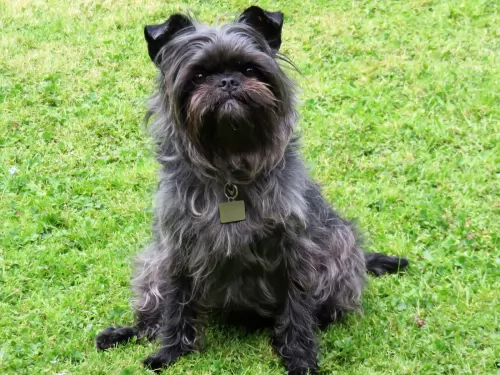 This breed originated from Germany. The latest information on this breed is from the 17th century. Actually, Affenpinscher got its name from Affe, which means monkey. Their accentors considered to be Brussels Griffon and Mini Schnauzer. People trained this breed to be a working dog, to remove rodents, granaries, and stables from the living area.
This breed originated from Germany. The latest information on this breed is from the 17th century. Actually, Affenpinscher got its name from Affe, which means monkey. Their accentors considered to be Brussels Griffon and Mini Schnauzer. People trained this breed to be a working dog, to remove rodents, granaries, and stables from the living area.
 This large breed dog is also known as the Mee Kyun Dosa. In spite of his huge size, he isn’t aggressive at all and is bred to be a companion dog.
This large breed dog is also known as the Mee Kyun Dosa. In spite of his huge size, he isn’t aggressive at all and is bred to be a companion dog.
He was originally developed to be a working dog. The dog was developed in the late 1800’s from European and Asian working breeds. Those interested in dog breeds suspected that a crossing of the Japanese Tosa-Inu with the Neapolitan Mastiff and the Dogue de Bordeaux brought about the breed. They also thought that the Saint Bernard and English Mastiff were brought in later on as well.
These large molosser dogs have been developed through years of inbreeding. It is one of the biggest dogs in Korea.
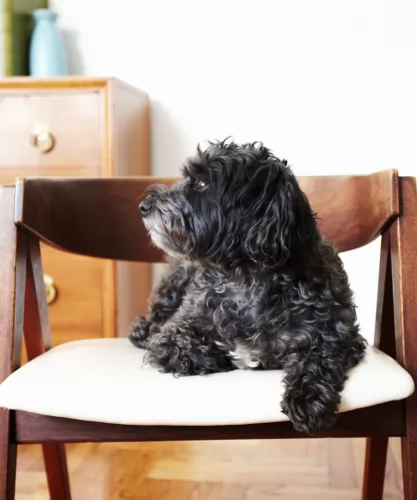 Affenpinscher is a toy size breed and it weights between 2.6 kg to 6 kg. There is no big difference between male and a female dog.
Affenpinscher is a toy size breed and it weights between 2.6 kg to 6 kg. There is no big difference between male and a female dog.
The height of the breed is approximately 23 to 30cm. They have monkey-like expressions, and that is why it got its name. The primary color of the coat is black, but it can be gray, brown, red, white). Every club has a list of acceptable colors. Not all the colors are accepted in every country.
The lifespan of Affenpinscher variates from dog to dog, but it is on average 11.4. That is a typical lifespan of dog that size, but they can live much more depends on the care and health of the dog.
Litter size of Affenpinscher is 1-3 puppies. They are very small dogs, so having a small number of puppies is normal for mini breeds.
Other Names of Affenpinscher are monkey dog, Affen or Affie. All the other names are related to its size and monkey-like look.
 You can’t help but stare at the Korean Mastiff because of his strong, muscular neck of loose skin that forms dewlaps. His face is wrinkled and he has a cumbersome, sluggish gait.
You can’t help but stare at the Korean Mastiff because of his strong, muscular neck of loose skin that forms dewlaps. His face is wrinkled and he has a cumbersome, sluggish gait.
He is a large dog standing at anything between 59 to 76cm in height, both male and female. He can weigh between 65 to 74kg. He is noticeable because of his fairly loose fitting coat, which is short and smooth and which is a rich, shiny reddish, orange or brown colour.
The nose of the dog is broad and dark, the ears soft and floppy and he has eyes which are set wide apart.
The Korean Mastiff is reserved with strangers but he is friendly and even tempered with his human family, making an ideal pet.
He is looked upon as a gentle giant, being an oversized playmate for children and he also tolerates other pets in the home.
He isn't an overly energetic dog, but that doesn't mean he shouldn't be exercised. He will need long walks to avoid him putting on weight.
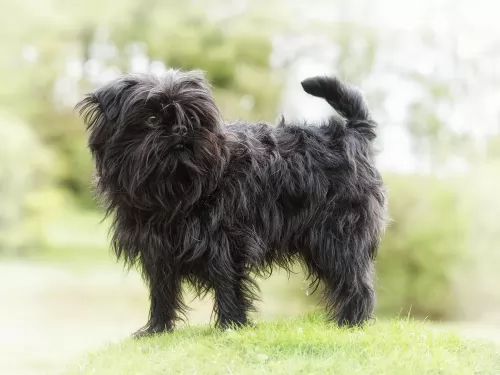 Affenpinscher is a toy sized dog, so they are fragile and you always have to watch out for them. They require a lot of training because they are very stubborn. Breed experts recommend positive training because they can’t respond badly and get depressed if you practice old ways of practice, which include punishments.
Affenpinscher is a toy sized dog, so they are fragile and you always have to watch out for them. They require a lot of training because they are very stubborn. Breed experts recommend positive training because they can’t respond badly and get depressed if you practice old ways of practice, which include punishments.
They tend to bark a lot and can be unfriendly to guests and other animals. It is important to train them properly and to spend as much time as they can with other animals.
The great thing about Affenpinscher is that they are very easy to carry around and they are beautiful little dogs. They are braver than most of the toy dogs because of the terrier descent. The funny thing about them is that they take themselves very seriously which can be very funny to the owners.
They don’t need a lot of exercises. They love walking, but they do not require a lot of it.
Affenpinscher is a great watch dog. They tend to protect the house and they are amazing dogs for watching.
They are not very good with children because they are very sensitive and they love attention. It is also important not to spoil them, even if it’s funny sometimes, it is not recommended to spoil your dog.
 Your huge Korean Mastiff is a good natured dog who isn’t aggressive. He loves being with his human family and makes a particularly good pet when he has been trained and socialized.
Your huge Korean Mastiff is a good natured dog who isn’t aggressive. He loves being with his human family and makes a particularly good pet when he has been trained and socialized.
He likes a firm but fair owner who takes a leader-of-the-pack role. In spite of his largeness and sluggishness, he can be quite agile and makes a good watchdog too.
All round, the Korean Mastiff, known as a gentle giant, is capable of making you a splendidly friendly, loving canine companion.
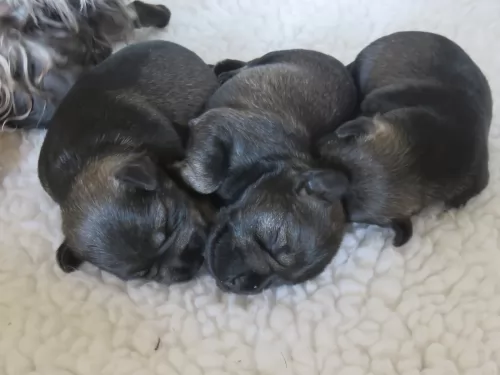 It is very important to choose a quality puppy from a quality breed. Affenpinscher can have some health problems. Hip dysplasia collapsed trachea, and the luxating patella is the most common health complications of this breed. But, the most of the dogs die of an old age, so if you are choosing wisely, and with proper education and consulting, you will have a happy and a healthy dog.
It is very important to choose a quality puppy from a quality breed. Affenpinscher can have some health problems. Hip dysplasia collapsed trachea, and the luxating patella is the most common health complications of this breed. But, the most of the dogs die of an old age, so if you are choosing wisely, and with proper education and consulting, you will have a happy and a healthy dog.
 Treat your big Mastiff dog like the wonderful fur-child he is and make sure your attend to all his medical needs to avoid pain and discomfort for him.
Treat your big Mastiff dog like the wonderful fur-child he is and make sure your attend to all his medical needs to avoid pain and discomfort for him.
Cherry eye is a fairly common health issue with this breed. It affects the tear gland of the third eyelid, and if left untreated, can lead to ongoing eye problems.
All dogs have a third eyelid, as well as two tear producing glands to lubricate the eyes. Its an important protective component to eye health in dogs. When the connective tissue that holds the gland in place is damaged or weak, there is a red protrusion of the gland from the lower eye. This is a congenital disorder. Don’t ignore it, but get your pet to the vet so you can catch it early.
Canine bloat, known as gastric dilatation and volvulus can be a killer disease for your pet, more so with deep-chested, large breeds.
Gas accumulation is known as bloat, and its the accumulation of gas which can cause the stomach to rotate. A dog can go into shock from bloat. The reason for this is that the stomach expands, putting pressure on veins. Blood can’t flow as it should and the blood supply gets cut off to the stomach.
Your dog could be vomiting, restless, the stomach hard and bloated or he may be drooling. Dogs who gobble their food down and eat just one large meal a day have an increased susceptibility to GDV than other dogs.
The wrong ingredients of a dog’s diet can also contribute to bloat. High quality food and feeding your pet smaller meals can help.
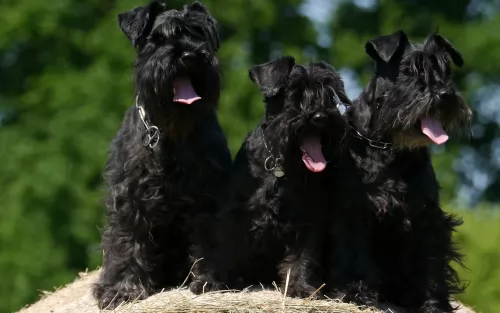 Affenpinscher daily amount food should be based on a size and activity of the dog. But approximately ¼ or ½ cup of high-quality food should be enough for your dog. It is recommended to divide into two meals per day. You can also add some vegetables, oil, meat or fruits into a meal, but only small size portions.
Affenpinscher daily amount food should be based on a size and activity of the dog. But approximately ¼ or ½ cup of high-quality food should be enough for your dog. It is recommended to divide into two meals per day. You can also add some vegetables, oil, meat or fruits into a meal, but only small size portions.
Feeding Affenpinscher puppy is similar to feeding an adult dog. The difference is in a number of meals per day. It is recommended to give 3-5 portions per day for a puppy.
Also giving vitamins and minerals to a puppy dog is very important for health.
Grooming the Affenpinscher could be a challenging task. It requires regular care with every day brushing and cleaning. They have a strong and rough coat. A good side of that is Affen size. They are not big, so there wouldn’t be a lot to groom.
 A Korean Mastiff is an easy dog to groom with his short smooth coat. He is a moderate shedder so a brush twice a week will be sufficient to maintain the shiny, smooth condition of his coat.
A Korean Mastiff is an easy dog to groom with his short smooth coat. He is a moderate shedder so a brush twice a week will be sufficient to maintain the shiny, smooth condition of his coat.
Because the dog has lots of skin and folds, these folds will need to be washed and kept clean as grime can collect.
While you're busy attending to his skin check his nails too and check inside and outside his ears for signs of redness and irritation.
Puppies use up more energy than mature adults, requiring a diet of good quality protein. Dogs that have been spayed or neutered will require less calories as will senior dogs.
Korean Mastiffs require high quality nutrition, and if its dry kibble, make sure its the best brand. Mix in some home-made food such as cooked chicken, brown rice and vegetables from time to time as well as some raw meat occasionally.
Protein and fat from good sources are top ingredients for your Korean Mastiff. Avoid food with allergens such as corn and wheat, sweeteners, preservatives and colorants.
Make sure your large pet has constant access to fresh water.